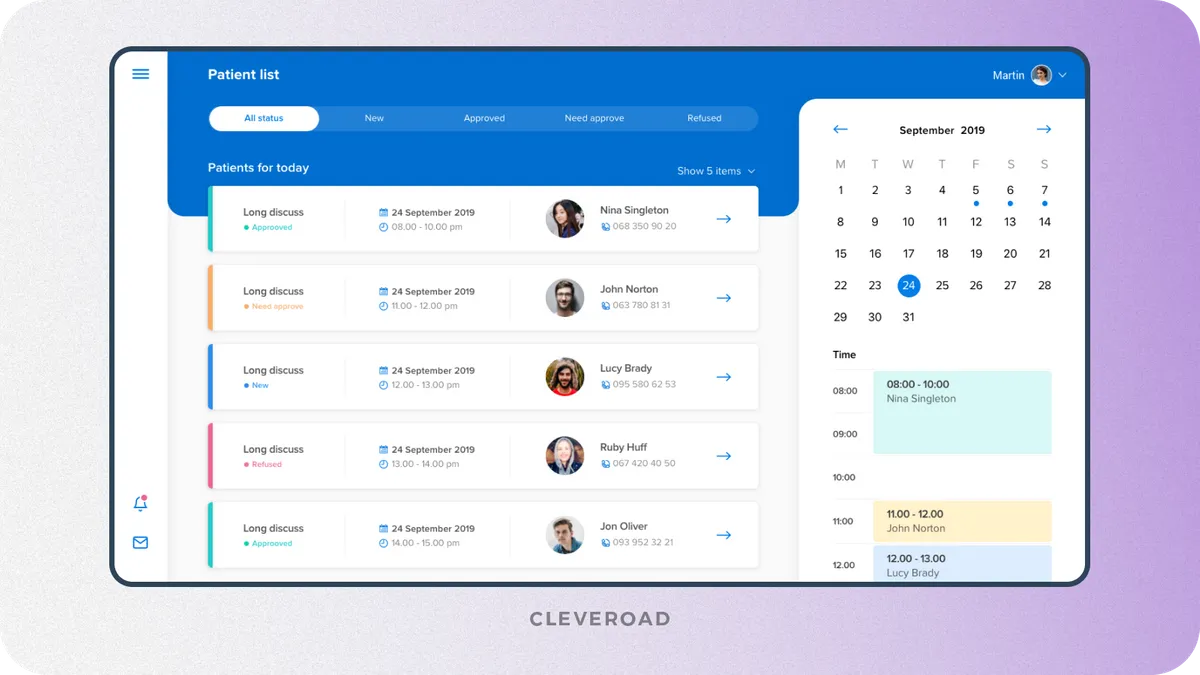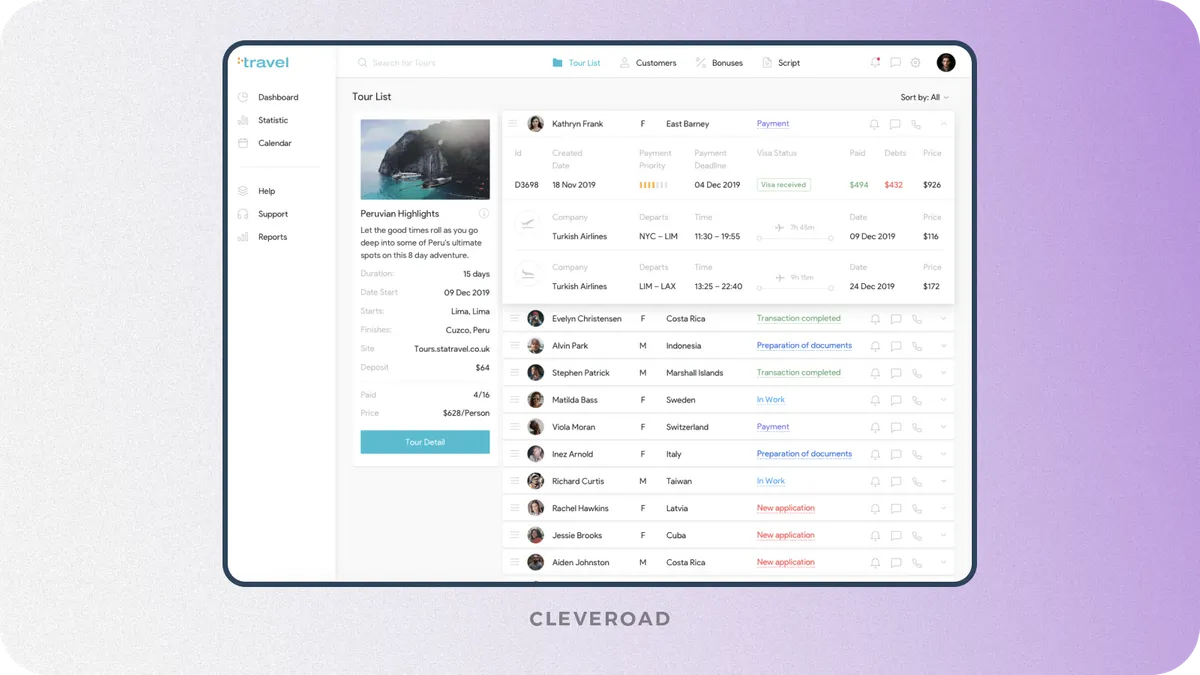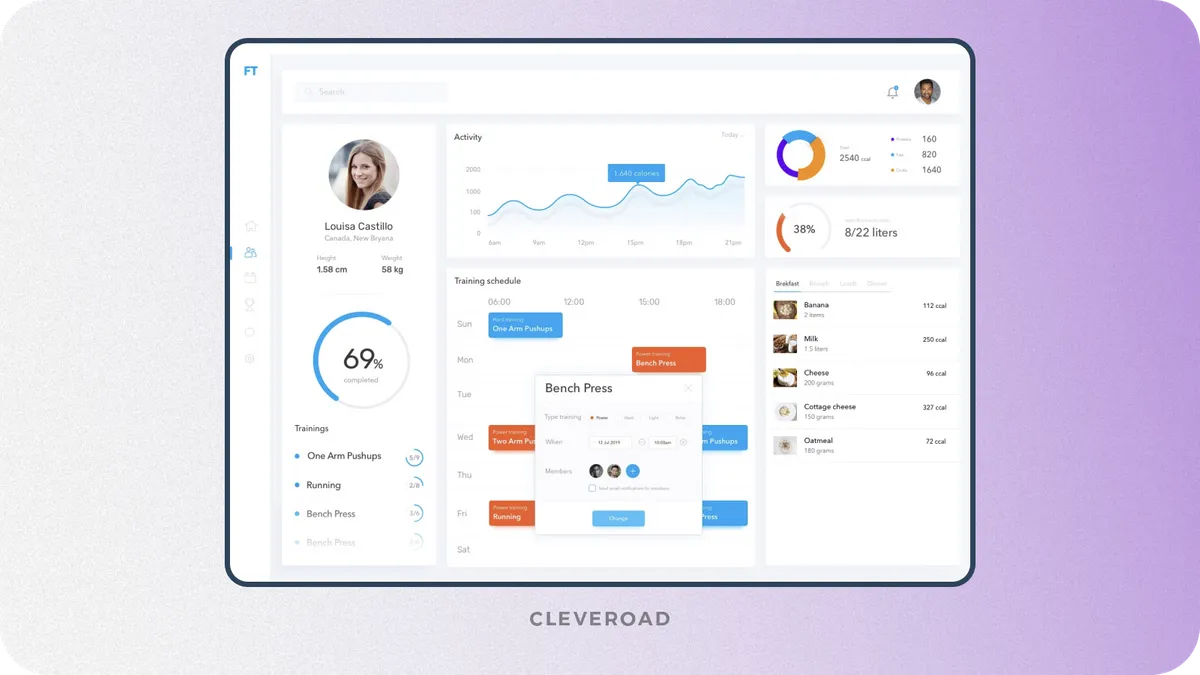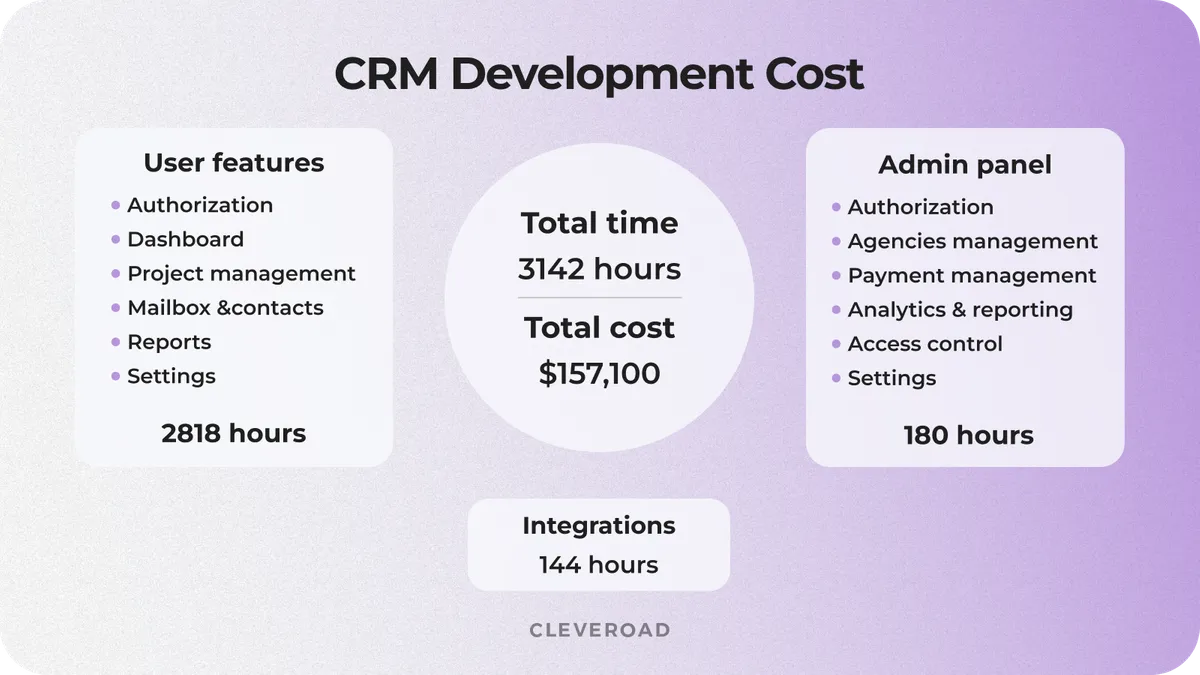CRM System Development: How to Create CRM for Your Business Properly?
Updated 19 Feb 2025
16 Min
2430 Views
What is CRM software development? It is a process of creating a customer relationship management system, allowing businesses to improve client-related operations. CRM development is valuable for sales, marketing, and customer support managers in today's business environment. There are many off-the-shelf CRM solutions available, but companies face difficulties using them daily due to a lack of compatibility with business processes or failure to streamline routine actions.
At Cleveroad, we have hands-on experience in developing CRMs for different domains and are ready to share this experience with you in this comprehensive guide. You will find out the major CRM building strategies, steps to perform the system’s building as well as CRM integration, the cost to develop a CRM system, and many other business information.
What Is CRM Development and Why It Is Beneficial
CRM stands for customer relationship management. Thus, CRM software is a tool that allows businesses to centralize customer data, such as contact details, purchase history, preferences, and communication history. It helps businesses have a comprehensive view of each customer and enables personalized interactions and targeted marketing campaigns.
To obtain the said capabilities, you should be involved in CRM development – a process of creating a software system that enables business owners to effectively monitor and oversee communication and interactions with both prospective leads and existing clients.
When you think about CRM implementation into your business, you always stand before a choice to order a ready-made system with a limited set of functionality or to choose a custom development of CRM. We give the most essential reasons why you should build a custom CRM for your organization.
Enhanced customer relationships
According to Forbes, 81% of customers prefer companies that offer personalized experiences, which makes it very important to have a tailored approach to providing strong customer relationships. Having a comprehensive view of each customer's history will help you tailor their interactions and offerings to suit individual needs. CRM development fosters stronger relationships between your company and customers, as well as increases client satisfaction.
Improved sales performance
Through features like lead scoring and automated follow-ups, CRM systems help sales teams prioritize their efforts, streamline workflows, and close deals more effectively. Kixie reported that companies implementing CRM systems get an average increase of 29% in sales, underscoring the positive impact of CRM on sales performance. What is more, by tracking sales metrics and performance, businesses can continuously refine their approaches, leading to increased sales efficiency and revenue growth.
Streamlined marketing efforts
A custom software for client relationship management serves as a centralized platform for handling marketing campaigns, leads, and customer engagement. WebFX said that 74% of businesses state that CRM software development provides more targeted and efficient marketing strategies. By segmenting customers based on demographics, behaviors, or purchase history, businesses can create targeted marketing campaigns that resonate with specific audience segments.
Better customer service
According to Data Axle USA, 75% of organizations using a CRM software have seen a significant improvement in customer satisfaction metrics. CRM system development empowers customer service teams by providing access to comprehensive customer profiles, previous interactions, and support tickets. It enables your business to offer personalized assistance, resolve issues more efficiently, and exceed customer expectations while facilitating the automation of routine tasks, such as ticket routing and response management.
Every business can benefit from the custom development of CRM systems from scratch. For example, you can create custom CRM software solutions for industries like healthcare CRM development or CRM for eCommerce, and so on. But in order to succeed, you need to consider the essential CRM app development strategies capable of helping you build the perfect product to handle relationships with your customers.
Cleveroad provides custom CRM development services. Learn how our expertise can help you boost client management
The Major CRM Development Approaches
In order for the CRM to meet all your needs, you need to decide on your development approach. Fundamentally, there are three main choices that you should focus on.
Make your choice between ready-made and custom CRM
When planning your customer relationship management software, you should select whether to choose an out-of-the-box CRM tool or a custom solution, and it’s time to weigh out their pros and cons.
Out-of-the-box business CRM solutions offer a ready-made solution for managing customer relationships, typically featuring pre-built functionalities such as contact management, sales tracking, and customer support ticketing systems. These ready-made CRMs are often easy to implement and come with standard features suitable for various industries. However, they may lack flexibility and fail to address your specific business needs, increasing the costs.
Custom CRMs, in their turn, are tailored to the unique requirements of your business by CRM software developers. These relationship management systems offer the flexibility to incorporate bespoke features and workflows that align precisely with the organization's processes, providing a more seamless user experience. With such an approach, custom CRMs provide more effective cost management and easier maintenance in the long term.
Kindly note that as far as your company grows, your business requirements change, necessitating changes accordingly, so a tailored relationship management system from a custom CRM development company becomes more suitable.

An example of custom CRM for doctors developed by Cleveroad (source: Dribbble)
Standalone vs. integrated CRM
Considering how to build your own CRM system, you should choose between a standalone system and integrated with other business solutions. The right choice depends on your needs, budget, and long-term goals.
A standalone CRM works independently without connecting to other business tools, such as payment gateways, marketing automation platforms, ERP systems, and communication tools. It focuses only on customer relationship management. This option is simpler, faster to develop, and easier to maintain. It suits businesses that need a basic system without complex integrations. However, it may lead to data silos and limit efficiency as your business grows.
On the other hand, integrated CRM development ensures a cohesive and unified approach to data management and business operations. By avoiding silos and fostering interoperability, you can enhance efficiency and reduce the complexities associated with managing disparate software solutions. Integrated CRM allows you to optimize your workflow by seamlessly connecting with such business systems:
- Enterprise Resource Planning (ERP) software
- Accounting systems
- Marketing platforms
- E-commerce platforms
- Call centers and VoIP systems
- Human Resource Management (HRM) systems
- Document management and e-signature systems
- Calendar systems and schedulers
Integration capabilities are crucial for a custom CRM system to effectively align with your internal business processes. So, it's imperative that the skilled software development partner can seamlessly integrate the new solution with your existing software systems within CRM development services.
How to implement a CRM in your digital business ecosystem – read our article and know more!
Cloud-based vs. on-premise CRM
Choosing between cloud-based and on-premise CRM depends on your business needs, budget, and IT resources. Each option offers unique benefits.
Developing a cloud-based CRM solution offers numerous advantages, including CRM development cost reduction and scalable data storage. Moreover, cloud CRMs facilitate your data accessibility from anywhere, enabling remote collaboration and enhancing flexibility.
With data stored in the cloud, businesses can also enjoy improved security measures and ease of data backup. The cloud app development approach not only streamlines technical maintenance but also future-proofs the CRM system, allowing for easy updates and scalability as the business evolves.
On-premise CRM runs on your company’s servers. You control data, security, and system updates. This setup works well for businesses that handle sensitive information and need strict data management policies. However, such CRM development requires a larger upfront investment, dedicated IT staff, and ongoing maintenance. Unlike cloud-based solutions, scaling an on-premise custom CRM may be complex and expensive.
CRM Development Process: Essential Steps
Let’s single out the steps of CRM application development you should pass to create a resilient system for your business.
Step 1. Find a tech team
CRM is a complicated system with a bunch of integrations, so you should hire a CRM software developer team to manage the possible intricacies of creating a CRM from scratch. There are three widespread options for hiring relationship management software engineers:
In-house team
By hiring an in-house tech team, you can control the development process and have smooth communication. But this option is the most expensive since there are a lot of additional expenses like rent, hardware, software, taxes, and more.
Outsourcing IT vendor
Due to affordable rates and the high quality of the final product, outsourced CRM development to a third-party IT vendor becomes a good option for many companies. You can also hire a dedicated development team for custom CRM solution creation. This way, you’ll get a pre-screened team of software developers with the necessary experience and expertise for CRM development.
Moreover, if you don't need the whole team, you can use IT staff augmentation services. They are an approach when you hire a few remote specialists to supplement your technical expertise.
In our experience, outsourcing CRM custom software development is the most suitable option for your business if you want to build a CRM quickly and cost-effectively while leveraging the expertise of specialized professionals.
We’ve comprehensively described how to outsource software development successfully. Check out our article to learn more
Step 2. Conduct business requirements analysis
After you have found a reliable CRM building provider and started cooperating with them, they help you prepare for the project development. For example, starting a CRM development collaboration with our team, you’ll be engaged first in the Solution workshop stage with our Business Analysts, UI/UX designer and a Solution Architect. Our specialists will accurately define your business needs and problems to solve with an upcoming bespoke CRM development for your company. As a result, they identify a project scope, prepare a top-notch feature list and sketch the architecture of your future customer relationship management system.
Then, the Discovery Phase Services from our specialists will help speed up the development process and enhance your future CRM’s quality. You will get the project specification plan considering all the details as to the customer relationship management system’s development (particularly, tech stack, functionality, third-party integrations). Moreover, they’ll help you refine the architecture of your future CRM solution for its flawless work.
These are the following major features you should integrate into your CRM software:
- Sales automation
- Contact management
- Lead and pipeline management
- Activity tracking
- Reporting and analytical data
- Customization options
Step 3. CRM design and development
At the same time as the Discovery stage activities, the UI/UX designers work on building the interface of your upcoming CRM, starting from the design concept and prototype creation while rendering UI/UX development services. Then, they hand the CRM development process to the software engineers.
During the development stage, software engineers create the backend and front end of the CRM platform and incorporate APIs to enable data sharing with third-party applications. After customized CRM development is finished, it should be integrated with other business solutions (e.g., marketing automation software, document management solutions, scheduling systems) to ensure comprehensive coverage of all business operations and maximize profit through system synergies.
At this time QA engineers check every piece of created CRM functionality with the help of manual and automated tests to evaluate the functional requirements of the CRM and address any operational issues. Before your final review, the team performs a comprehensive verification of all new CRM functionalities, including integrations, usability, and security, to ensure that your CRM functions as intended and meets project requirements.

Travel CRM interface designed by Cleveroad (source: Dribbble)
Step 4. Release and support
We help you release the created relationship management product after the CRM app development is finished and deploy it in your company’s digital ecosystem. Once the CRM software development project is complete, the finished solution is provided to your company for testing and feedback.
But kindly note the custom CRM application is a complicated system with many integrations, so you may need to support and improve your software constantly for CRM software success. So, it’s better to continue cooperation with the custom CRM software development company.
Usually, CRM projects maintenance stands for:
- Bug fixing
- Code optimization
- Latest OS versions support
- Adding new custom features
- Stability and performance improvements
- Supporting the latest versions of third-party services
What to Consider Before CRM Development Process Starts
The proper CRM development and implementation is a cornerstone of your successful relationships with customers. There are points you should consider to benefit from your desktop or mobile CRM.
Establish your business aims
Setting specific business aims before the development of CRM is essential for creating an effective CRM strategy. What is your desired outcome? Finding the answer to this question is essential before you start researching how to create your own CRM system. Some possible objectives tailored to your business may include improving customer satisfaction, increasing sales, increasing customer retention, or improving operational efficiency.
Care about your CRM design
Designing the CRM system with the end-users in mind is essential for its adoption and success. Consider the needs and preferences of different user groups, including sales representatives, customer service agents, and marketing professionals. Ensure the interface is intuitive, easy to navigate, and customizable to accommodate diverse workflows and preferences. Conduct user testing and gather feedback throughout the development process to refine the user experience.
While creating your CRM design, you may use the crucial points for an easy-to-use design creation:
- Incorporate modern design principles and best practices to enhance usability and appeal when you create your own CRM with an outsourcing vendor
- Utilize clear visual hierarchy, intuitive navigation menus, and interactive elements to guide users seamlessly through the system.
- Pay attention to typography, color schemes, and branding elements to create a cohesive and visually appealing interface that reflects your company's identity.
- Consider incorporating features such as drag-and-drop functionality, context-sensitive help tools, and personalized dashboards to further enhance user satisfaction and productivity.
By prioritizing user-centric design principles, you can create a custom CRM that meets the functional needs of your users and also delights them with a visually appealing and intuitive interface.

CRM for training industry designed by Cleveroad (source: Dribbble)
Think out data security
Define data storage and access policies, ensuring compliance with relevant regulations such as GDPR or HIPAA. At Cleveroad, we implement encryption, authentication, and access controls to safeguard sensitive customer information during CRM system development. Also, our team creates data backup and disaster recovery mechanisms to prevent data loss and ensure business continuity. In addition to defining CRM data storage and access policies, it's important for us to establish clear protocols for data governance and quality assurance. This includes:
- Implementing standardized data entry procedures
- Data validation checks
- Periodic data audits to maintain data accuracy and integrity.
Consider implementing Role-Based Access Controls (RBAC) to restrict access to sensitive information based on users' roles and responsibilities within the organization.
Ensure your CRM is mobile-friendly
Your comprehensive CRM system should be responsive and optimized for various devices and screen sizes, allowing users to access critical information anytime, anywhere. Consider developing native mobile apps or providing a mobile-friendly web interface to enhance usability and productivity for users on the go. Additionally, prioritize features that are specifically tailored for mobile use, such as touch-friendly interfaces, offline access to data, and seamless integration with device functionalities like GPS or camera.
Conduct thorough testing across different mobile platforms and devices to ensure a consistent and reliable user experience across all mobile touchpoints. By prioritizing mobile accessibility, you empower your company staff to stay connected and productive, whether they're in the office, on the road, or working remotely.
Optimize business processes
To maximize the benefits of building a CRM, it's crucial to review and optimize business processes. Identify areas where developing CRM software to manage specific tasks can streamline operations. This involves optimizing sales processes, automating marketing campaigns, efficiently handling customer service inquiries, and managing customer interactions seamlessly. The ultimate goal is to enhance efficiency, accuracy, and overall customer data management through CRM development services.
Integrations to optimize time and costs
Building everything from the ground up takes too much time and money. So, use integrations. Instead of developing every feature from scratch, connect third-party services. Such an approach speeds up CRM system development and cuts costs.
At Cleveroad, we create CRM systems implementing various integrations. For payments, we integrate Stripe or PayPal to handle transactions securely. If you need email marketing, we plug in Mailchimp or SendGrid to automate campaigns. Data management is another area where integrations help. SAP, NetSuite, or Oracle ERP will streamline operations. For project management, we use tools like Trello, Asana, Jira, and Monday.com to help teams stay on track.
Integrations turn CRM software development into a faster, more cost-effective process. Instead of reinventing the wheel, focus on making your CRM powerful and user-friendly.
Price for CRM Development
It’s quite complicated to determine the price of a custom CRM building since it can vary between $95,000 and $350,000+. Everything depends on CRM complexity and your requirements. To figure out the exact development cost, it’s better to consult with the vendor’s development team. You should explain your business goals to the IT specialists to get a more precise estimate.
As you can see, the CRM implementation cost may vary. Let's take a look at some of the main CRM system’s price drivers:
- Project complexity. The more complicated features you add, the higher the cost will be. Custom CRM developers need more time to build core features, not talking about a higher qualification.
- CRM software engineers’ seniority level. It’s common to divide custom CRM developers into three categories depending on their work experience — junior, middle, and senior ones. In the case of CRM systems, it’s better to hire more experienced specialists — middle or senior developers.
- CRM developers’ location. Development price varies based on the team’s location. For example, if you choose a CRM development outsourcing, you should know that companies from North America charge one of the highest rates in the world. On the contrary, Asian software development companies have the lowest rates, but the product’s quality is often questionable.
In order to show you the CRM development cost overview, our specialists have calculated it on the example of wedding CRM.

Approximate time and cost to build CRM system
Please kindly note that the given CRM development cost and timing are APPROXIMATE. To know more, you can contact us to get the answers concerning your CRM costs from our specialists.
Cleveroad Expertise in CRM Software Development
At Cleveroad, we offer CRM development services since 2011. Our experts create robust CRM solutions for startup companies, SMBs and large enterprises from domains like Healthcare, Logistics, Retail, Education, and others.
Working with us, you’ll receive:
- First hand experience in developing CRM solutions for different business domains to increase your customer retention percent
- On-demand IT services: CRM system development from scratch, UI/UX design services, CRM software modernization, cloud app development services, etc.
- Providing a CRM multi-user support to create different access rights to CRM modules
- An ISO-certified company implementing ISO 9001 quality management systems and ISO 27001 security standards
- Expertise in integrating your built CRM with such third-party tools as SurveyMonkey, Zendesk. Slack, Automate.io, and others
- Project Management Office department to effectively manage your projects and ensure timely delivery and efficient resource allocation
- Safe and secure business data transferring performed by our IT experts into a single CRM system built with the PostgreSQL or MySQL tools
We aim to showcase our expertise in developing complex custom systems to automate business flows. Here is an example of an automated system we’ve created for medical device manufacturers — a Quality Management System (QMS). This project involved the development of a fully automated QMS covering all processes and documentation flow of the company's clients. The created system has a complex modular architecture and includes management of Documents, Actions, Training Records, and Human Resources. We're developing the solution considering the whole our clients' business needs, context, and workflow and strictly adhering to compliance with FDA 21 CFR 820 and 21 CFR 11 and the ISO 13485 requirements.
Here's what our client, Breanne Butler, Client Liaison Officer, says about working with Cleveroad:
Breanne Butler, Client Liaison Officer at Prime Path Medtech™
Tell us more about your CRM concept
Share your CRM concept with us, our certified experts will study your request and provide you with full-fledged CRM development services to drive your customer retention
CRM development refers to the process of creating or customizing CRM (Customer Relationship Management) software solutions to meet specific business needs. While standard CRM platforms offer pre-built features and functionalities to manage customer interactions, custom CRM software solutions are tailored to address unique requirements and workflows of a particular organization.
CRM can help businesses streamline sales processes, improve customer service, enhance marketing strategies, and increase overall efficiency. By leveraging custom CRM software solutions, organizations can ensure that their CRM system aligns perfectly with their business objectives, workflows, and industry-specific requirements.
To build your own CRM software, you may pass the following steps:
- Step 1. Find your team
- Step 2. Make necessary preparations for CRM creation
- Step 3. Conduct CRM design and development with your vendor
- Step 4. Get the system’s release and support
A CRM software developer is a professional specializing in the creation, customization, and maintenance of Customer Relationship Management (CRM) software solutions. These developers possess expertise in developing tailored CRM systems to meet the unique requirements of businesses across various industries.
Businesses often seek to hire dedicated CRM developers who have experience in custom CRM development. These developers are proficient in understanding the specific needs of their clients and translating them into functional CRM solutions. They excel in CRM platform customization, adapting existing CRM platforms or building new ones from scratch to align with the workflows and objectives of their clients.
CRM application development refers to the process of creating software solutions tailored to manage customer relationships effectively. In today's business landscape, CRM systems offer indispensable tools for businesses to centralize and streamline their interactions with customers, prospects, and leads. Implementing CRM enables organizations to consolidate customer data, track interactions across various channels, and analyze customer behavior to better understand their needs and preferences.
Businesses often find the need for a CRM when they face challenges in managing customer information efficiently, such as scattered data across multiple platforms, inconsistent communication, or missed opportunities for engagement. To address these issues, organizations may opt to build custom CRM applications tailored to their specific requirements. This involves developing software that aligns with their unique business processes, integrates seamlessly with existing systems, and provides the necessary functionalities to enhance customer engagement and satisfaction.

Evgeniy Altynpara is a CTO and member of the Forbes Councils’ community of tech professionals. He is an expert in software development and technological entrepreneurship and has 10+years of experience in digital transformation consulting in Healthcare, FinTech, Supply Chain and Logistics
Give us your impressions about this article
Give us your impressions about this article